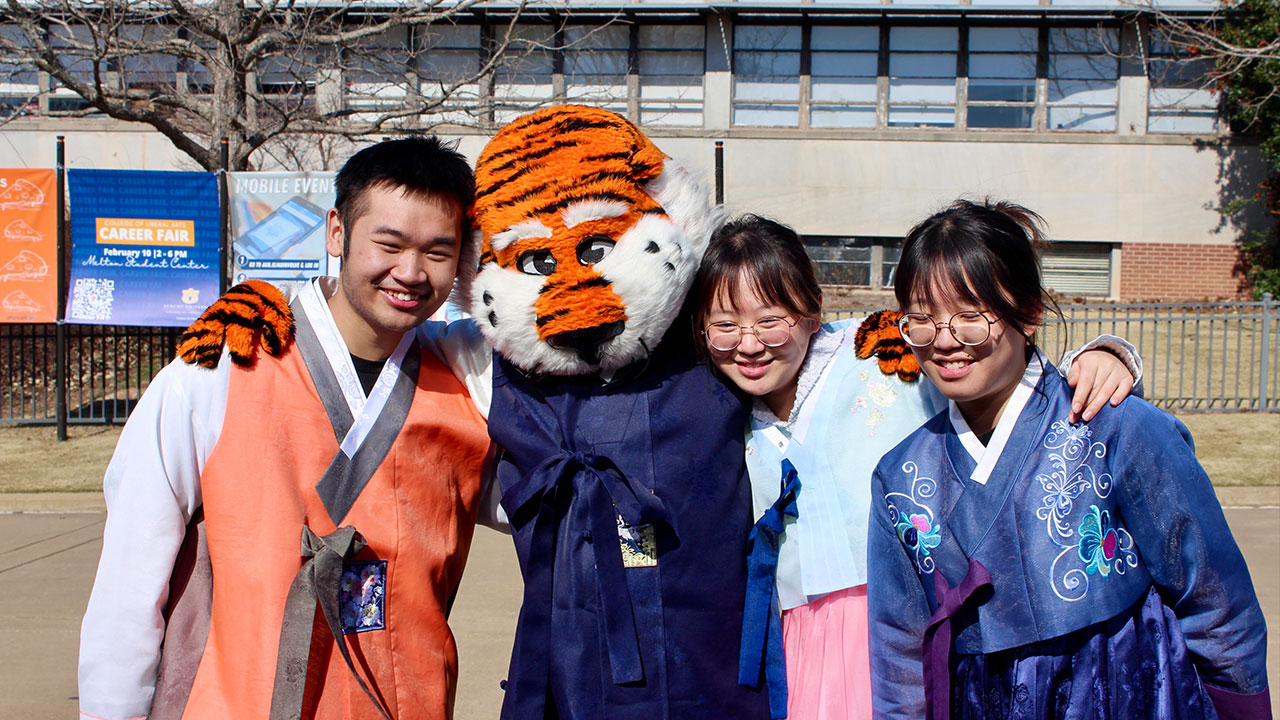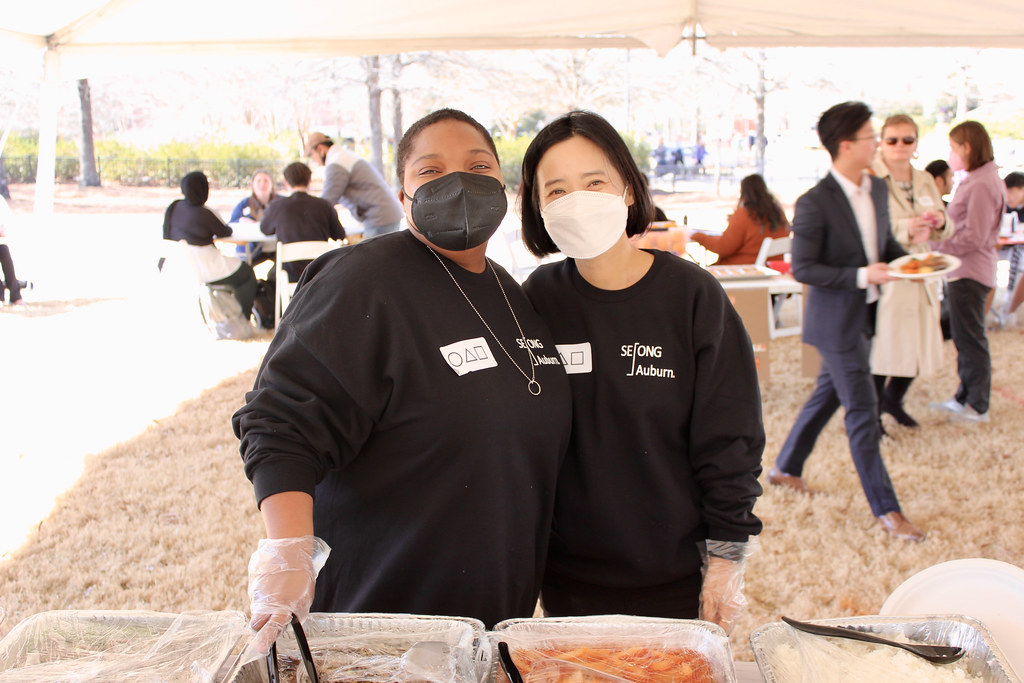content body
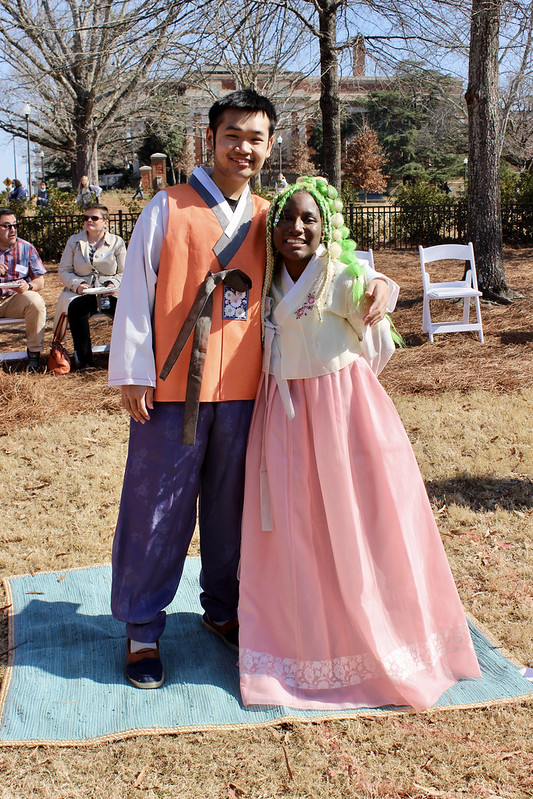
Two students wearing hanboks, the traditional clothing of the Korean people, pose during the Office of International Programs' Lunar New Year Celebration in 2022.
Instead of dressing in Auburn gear, students wore hanboks. Instead of eating Chick-fil-A for lunch, they filled plates with rice cakes and japchae, “three cup chicken” and Hong Kong style fish filet. Instead of throwing a Frisbee around, they played Tuho, a Korean game where players attempt to throw arrows into a special pot. Instead of taking notes on a laptop, they practiced Chinese calligraphy. These have all been events featured at the Office of International Programs’ (OIP) Lunar New Year celebrations through the years.
“Engaging Auburn community members in these cultural activities allows them to learn about new traditions, broaden their perspectives and develop a deeper appreciation for cultural diversity,” said Ellie Lee, director of academic programs for the Korea Center-King Sejong Institute. “Participating in events, like Lunar New Year celebrations, fosters an environment of inclusivity, where individuals from various backgrounds can come together to learn from one another. Such celebrations contribute to the development of well-rounded individuals who are not only academically knowledgeable but also globally minded.”
Lunar New Year, celebrated in China, South Korea, Vietnam and other countries with a large overseas Chinese population, according to National Museum of Asian Art, marks the beginning of a new year on the lunisolar calendar.
OIP’s Lunar New Year event will take place this year on Wednesday, Feb. 7, from noon-2 p.m. at the Melton Student Center, rooms 2222-2223. Auburn students, staff, faculty and community members can look forward to receiving red envelopes from the Taiwan Center and enjoying traditional Taiwanese and Korean foods. Those who entered this year’s online raffle will also receive their prizes — goodie bags filled with treats from both the Korea and Taiwan centers.
“Lunar New Year is a great way to learn more about Asian culture and traditions and to branch out because it’s not often you get to experience something like this, especially in a small town,” said Allison Shih, a senior studying nutrition science from Nashville, Tennessee.
Celebrating Lunar New Year at Auburn began in 2012 with the founding of the Korea Center. In 2022, the Korea Center partnered with the Auburn University-National Cheng Kung University (AU-NCKU) Taiwan Center of Chinese Language and Culture to sponsor this and other events. Both centers are part of OIP and the outcome of strategic collaborations with international partners.
Lukas Dill has been connected to the Taiwan Center since he was an undergraduate student studying organismal biology. He was first introduced to Lunar New Year by one of his Mandarin professors and said the holiday, “shows our students, some of whom may be far from home, that even though they aren’t with their families for the holidays, there is still a community to celebrate with here.”
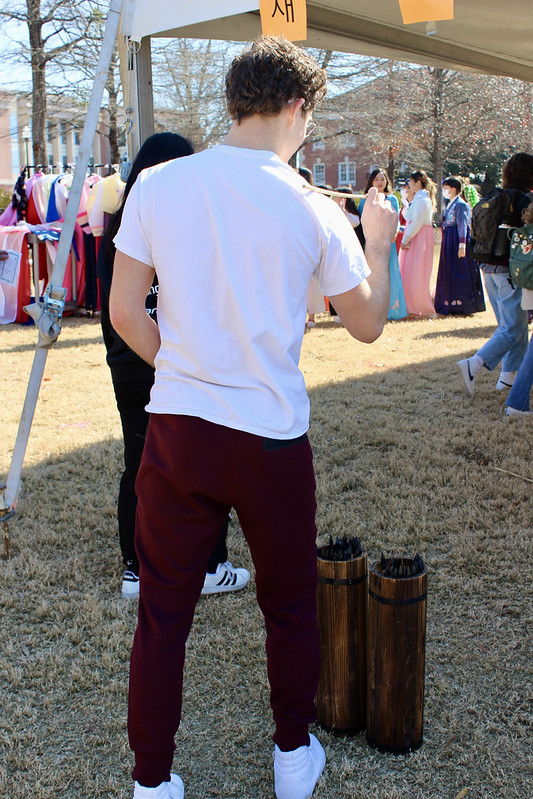
A student gets ready to throw an arrow in the traditional Korean game, Tuho.
Lunar New Year around the world
While Lunar New Year begins and is often celebrated on the first new moon of the lunar calendar — this year on Saturday, Feb. 10 — in the United States, the festival spans multiple days. While Chinese-speaking countries refer to it as the Chinese New Year, Vietnam celebrates Tết (t-et) and Korea’s holiday is called Seollal (see-ow-luhl).
In the days leading up to Lunars, many families will thoroughly clean their homes to remove any bad luck that might have accumulated in the previous year. During the festival, other traditions include giving red envelopes or silk pouches filled with money and other gifts, worshipping ancestors, participating in lantern festivals and playing games. Since the first day of the holiday is based on the cycles of the moon, the dates of the celebration change every year.
Lunar New Year also commemorates one of 12 animals on the zodiac calendar on an annual basis. While the zodiac may vary based on a country’s specific zodiac calendar, 2024 is widely regarded as the Year of the Dragon, which symbolizes good luck, strength and health.
“Being Taiwanese American, celebrating Lunar New Year is who I am,” Shih said. “Not only do I get to learn and experience more of my heritage and cultural traditions, but it’s also a time I get to be with family.
At home, her family celebrates by gathering relatives together to eat hot pot and other Taiwanese dishes, play games — her family loves mahjong — and give and receive red envelopes.
While Lunar New Year looks different for many cultures and individual families, Sarah Ting, coordinator for AU-NCKU’s Taiwan Center, said the community aspect is the most important.
“Lunar New Year is one of the most important holidays in Asian cultures, as it is a way of saying goodbye to the old and welcoming in a new and prosperous year. It is also a time of celebrating prosperity, abundance and togetherness,” Ting said. “Even if Lunar New Year celebrations might vary between the different countries, it is overall a time of coming together and celebrating.”
To plan for Auburn’s event, representatives from both centers meet a few months prior to the event to decide on the date, time and location. Then, special attention is given to the budget for the event and finalizing catering from both centers. In the past, the Taiwan Center has catered food from local restaurant Taste of Asia, with special attention given to providing food most students might not have tried.
Eli Whitworth, a fourth-year biosystems engineering major from Stafford, Virginia, was first introduced to Seollal while studying abroad in South Korea in early 2020. When she came to Auburn in the fall, she began taking Korean classes and is now the Korea Center’s student event coordinator. She also was excited to see that Auburn honored the holiday.
“[Celebrating Lunar New Year] feels like reconnecting with one of my favorite periods in my life. It is a reminder every year of all the wonderful things I’ve done and all I have to look forward to,” Whitworth said.
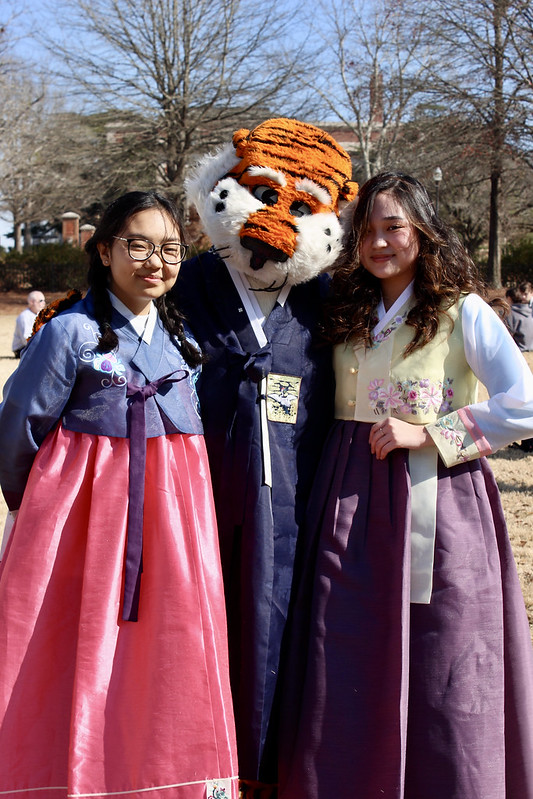
Two students pose with Aubie, all three wearing hanboks.
Bridging the gap between Auburn, Asia
Beyond Lunar New Year, the Korea and Taiwan centers work year-round to encourage interest in the traditions, cultures and foods of their respective countries.
The Taiwan Center does so by offering a handful of educational classes, including a non-credit Chinese language class, and events such as tea tasting and mahjong. The center also encourages cultural immersion through a study abroad scholarship for students interested in learning Chinese at Auburn’s partner university in Taiwan.
For those interested in connecting with Korean culture, the Korea Center has a handful of initiatives aimed at promoting language and cross-cultural understanding. Some of the highlighted programs include an annual K-Pop contest, the Korean Buddy Program, a Korean dance group and, of course, celebrating Lunar New Year.
“Interacting with people from different cultures not only promotes cultural awareness but also builds bridges of friendship and understanding. It creates a sense of community that transcends cultural boundaries, fostering connections and relationships among students and community members,” Lee said.
Daniel Kim, a senior marketing major from Auburn, is one of many students across campus who has found a community with the Korea Center. As an incoming freshman in 2020, he was, “really struggling with making connections due to COVID-19” and reached out to the Korea Center after participating in the center’s 2019 K-Pop party while in high school.
“They gave me the opportunity to really be involved with something bigger than myself, as well as support me with my own personal passions like creating a dance team on campus called KXD,” Kim said.
For Shih, becoming involved with the Taiwan Center not only allowed her to stay connected to her heritage while at college, but become more immersed in it by studying abroad in Taiwan. She called it the “highlight of highlights” of her college experience. Since getting back, Shih said she and her study abroad friends have been holding workshops for the Taiwan Center.
For students, faculty and staff who would like to stay connected to the Korea and Taiwan centers beyond Lunar New Year, they can find more information online or by visiting their offices in Foy Hall.
Korea Center – King Sejong Institute
244 Foy Hall | Facebook: Auburn King Sejong Institute | Instagram: @auburnkingsejong
Go to the Korea Center's websiteAuburn University – National Cheng Kung University Taiwan Center of Chinese Language and Culture
235 Foy Hall | Instagram @au_ncku_taiwan_center | YouTube: AU-NCKU Taiwan Center
Connect with the Taiwan Center


